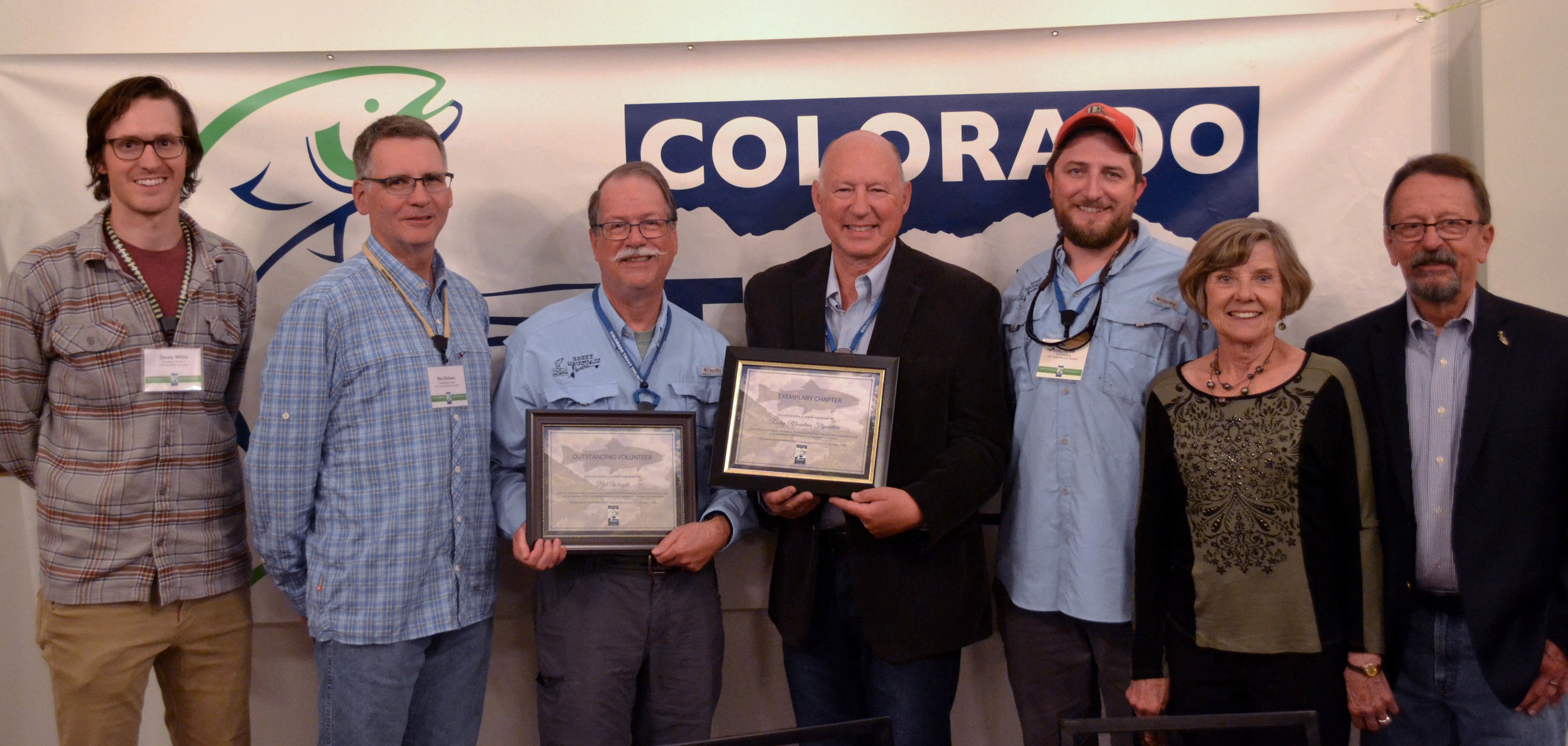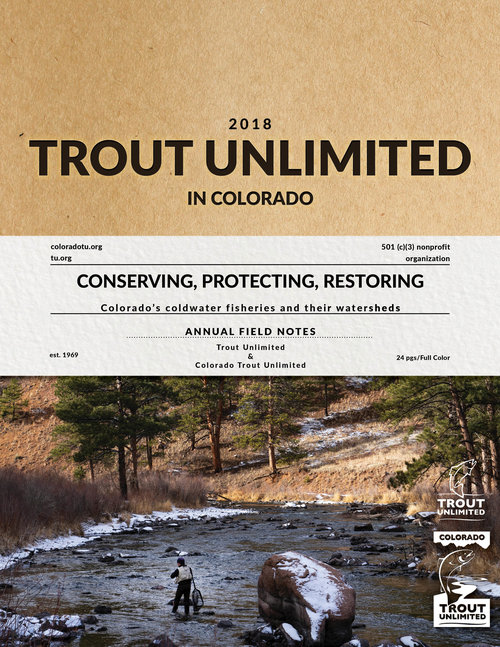Pictured: Awardee Kevin Rogers, Colorado Parks and Wildlife biologist and researcher.
At the annual Rendezvous at the Hotel Colorado in Glenwood Springs, Colorado TU presented its annual awards recognizing volunteers, chapters, and partners who have made exemplary contributions to TU and trout conservation in Colorado.
Colorado Parks and Wildlife biologist and researcher Kevin Rogers received the Trout Conservation Award. Kevin is a long-time native species researcher and has been an instrumental part of native cutthroat trout restoration efforts and developing and understanding the underlying science – including the new insights that have been gained about the different genetic lineages of cutthroat that guide restoration efforts statewide now. For years, Kevin has provided the scientific and moral leadership that guides cutthroat conservation and recovery statewide.
Black Canyon Anglers were honored as the Exemplary Guide & Outfitter for 2019. Black Canyon Anglers has been a long-time financial support of Trout Unlimited’s conservation efforts, including multiple years of providing a statewide raffle prize that has generated tens of thousands of dollars in proceeds. Additionally they have been active participants and provided logistical support for conservation efforts in the Gunnison Gorge including programs to help re-establish rainbow trout populations in the face of whirling disease.
Anglers All being presented with the Exemplary Industry Partner award from CTU.
Anglers All was recognized as the Exemplary Industry Partner. Through direct support and special events including their annual Trout Clave, Anglers All has generated thousands of dollars to support trout conservation in Colorado. Additionally they have been active partners on restoration and river cleanup efforts along the Denver South Platte.
Colorado TU presented two Distinguished Service Awards this year. The first went to volunteer leader Peter King with the Cutthroat Chapter for his successful efforts to link Trout Unlimited with new corporate funding partners, opening doors for support for youth education efforts from notable companies including Anadarko Petroleum and Conoco Phillips. The second went to Patrick, Miller and Noto LLC, a Carbondale based law firm that provided pro bono legal assistance to Colorado TU and American Rivers in the successful effort to eliminate the threat of Aspen-owned dams being build on Maroon and Castle Creeks including in the Snowmass-Maroon Bells Wilderness.
Rocky Mountain Flycasters Chapter received the Exemplary Chapter award (middle right) as well as the Outstanding Volunteer award going to member Phil Wright. (middle left)
The Rocky Mountain Flycasters Chapter (Ft Collins/Loveland/Greeley) was recognized as this year’s Exemplary Chapter. The Chapter was recognized for its strong community engagement programs around the Cache la Poudre River, its leadership with the ambitious Poudre Headwaters Restoration Project to restore greenback cutthroat trout through nearly 40 miles of headwater streams, and its strong youth education efforts including an annual youth day camp.
The Exemplary Youth Education Award was presented to the Collegiate Peaks Anglers for their partnership with the Greater Arkansas River Nature Center on the new South
Arkansas Ecological Learning Center and their model “Stream Explorers” program for youth education in the Salida area.
The John Connolly Outstanding Chapter Communications Award was presented to the Five Rivers Chapter. The chapter was recognized for its newly revamped website, social media, and email communication efforts including partnership efforts with local fly fishing and women’s groups to help broaden their reach in the Durango community.
Two chapters were recognized with the Exemplary Project Award. First, the Gunnison Angling Society was honored for its Adopt-a-Trout project, which combined STEM-based youth education while providing data that helped establish the foundation for new water leasing programs with agricultural producers in the valley and helped build stronger relationships among diverse local partners. Additionally, the Denver Chapter was honored for its “Long Underwater Non-Kinetic Embankment Replacement” structures (“LUNKER” structures) that provide shelter for aquatic life from current and predation, mimicking the natural habitat of an undercut bank in the highly modified Denver South Platte where natural undercut banks no longer exist.
Taila Oulton receiving an Outstanding Volunteer award for her work with the Colorado TU Youth Camp.
Finally, Colorado TU recognized five Outstanding Volunteers from various chapters across the state. Keith Krebs was recognized for his work with the Collegiate Peaks chapter in advancing the Ecological Learning Center as well as overall chapter leadership. Taila Oulton was honored for her seven years of participation as a counselor with the Colorado TU Youth Camp – as a former camper and young adult, Taila has not only shared her significant fly fishing knowledge but been a relatable role model for younger campers. Barbara Plake was honored for her work in launching and growing the Collegiate Peaks chapter’s “Fly Gals” program from 5 to more than 100 participants as well as managing the chapter scholarship program and Caddis Festival banquet. Dan Sullivan was recognized for leadership with the West Denver Chapter and in particular for his work in improving chapter communications and helping to expand participation in chapter events and volunteer projects. Phil Wright from the Rocky Mountain Flycasters Chapter was recognized for his work with native trout conservation efforts in the Poudre watershed including stream temperature monitoring of potential recovery habitats, assisting agency biologists with field work in preparation for restoration the Poudre headwaters, and developing community outreach efforts around the recovery project.
A hearty congratulations to all of our 2019 award winners – with deep thanks for all they have done to benefit Trout Unlimited and coldwater conservation.

























